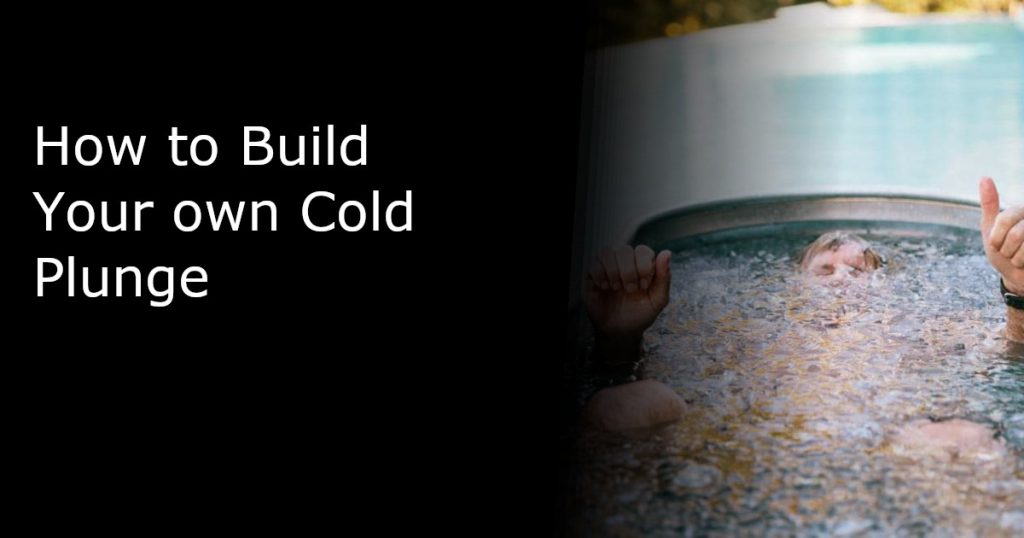Coldwater exposure is an amazing way to start your day. You go from being in a warm bed for hours to jumping into freezing water. This shocks your body and provides several benefits like increased energy, better mood, less muscle soreness, and faster weight loss.
So how do you experience all these benefits given that a retail cold plunge is pricey and hard to find? On top of that, there is the hassle that comes with choosing a cold plunge tub, setting it up, and keeping your tub cold and clean. Here we will help you solve this problem with the ultimate guide to building your own cold plunge!
Well, in this post you will learn;
- What you must know before buying your tub or any other equipment.
- How to select the right tub that fits your needs
- And how to keep your water clean and cold without any fuss.
Let’s get started!

Contents
What You Must Know Before Buying A Cold Plunge Setup
Buying a cold plunge setup isn’t for everyone. If you’ve never taken regular cold showers, start taking them as a means of cold water therapy instead of cold plunges.
This happens all the time. A beginner who isn’t used to the cold buys a cold plunge set up and when they first use it, they realize how cold it really is and never use it again. This is basically throwing money down the toilet.
Instead, start taking cold showers every day for 30 days since this will get you used to coldwater exposure. After 30 days, once you’ve gotten used to the cold, buy the necessary equipment and build your own cold plunge. And the first step is deciding what type of tub or freezer you want to use.
What Equipment Will I Need To Build A Cold Plunge Setup?
- A deep chest freezer
- Sealing material
- A temperature controller
- Food-grade hydrogen peroxide
- A water filtration device.
And that’s it! Now, onto step 1.
Step 1: Select A Tub Or Freezer That’s Tailored Towards Your Needs

There are hundreds of different tubs and freezers to choose from. Factors that will impact your decision include;
- How much you’re willing to spend on a tub or freezer.
- How big or small you want your setup to be.
- And do you want a chest freezer or a regular tub?
How Much Money Are You Willing To Spend?
Small, plastic cold plunge tubs start at 35 dollars and bigger chest freezers start at 100 dollars and can go for over 300 dollars. These expensive chest freezers often have everything you’ll need installed already like water filtration, temperature regulation, and timers needed to turn the freezer on and off automatically.
So before you consider anything else, consider how much money you’re willing to spend. It doesn’t have to be an exact number, rather a range. This will allow you to dish out some extra dollars for a convenient filtration device or timer.
How Big Do You Want Your Cold Plunge Setup To Be?
Do you have a house with a big driveway or yard? Or do you live in a studio apartment with barely enough space to fit an extra chair? This will all impact how big your cold plunge setup will be.
Even if you have more than enough space to park your cold plunge set up, I’d suggest sticking to one that has just enough space for you to sit in comfortably. Anything bigger will be useless since you’ll need to fill it with more water and that’ll impact your water bill.
There’s no reason to buy the best freezer or tub on the market. Instead, opt for a basic, deep chest freezer like this KoolMore 7 cubic feet chest freezer. There’s nothing fancy or complicated about it, it simply gets the job done.
Do You Fancy A Freezer Or Just A Regular Cold Plunge Tub?
There are two cold plunge options you can go for. Each has its own benefits and drawbacks.
- A regular cold plunge tub
- Or a freezer.
A regular tub is far cheaper than a freezer and it’s smaller so you don’t have to use as much water, but you must keep your water cold manually. This often involves buying bags of ice blocks and filling your tub with them.
A freezer is more expensive than a tub since it usually starts at 100 dollars. And you’ll also need to buy a tube of sealant to seal your freezer, so water doesn’t leak into and damage your freezer. But this shouldn’t cost more than 8 bucks.
What I love about a chest freezer, is that it allows you to keep your water cold without much fuss.
So if you can afford it and you have enough space, opt for a chest freezer. It allows you to keep your water cold without much effort and it’s easy to connect a filtration device to it.
Now that you know which option suits your needs better, let’s find out how to keep your water clean so you’re not bathing in debris.
Step 2: How To Keep Your Water Clean
Nobody likes jumping into dirty water. Not only does it smell horrible, but it may contain dangerous germs and bacteria that’ll make you sick.
So you have two options. You can either clean your cold plunge manually since it’s cheaper but more time-consuming. Or you can install a filter that automatically cleans your cold plunge.

Clean Your Water Manually
Cleaning your cold plunge manually is great if you have some free time and love cleaning. Personally, I love cleaning since it clears your mind and helps you relax. It’s almost like meditation. And if you’re like me, then cleaning your cold plunge manually is your best bet.
You’d want to clean your cold plunge every 1-2 weeks depending on how often you use it and how sweaty you are.
Most chest freezers or cold plunge tubs will have a little drain plug on the bottom. Simply pull it and all the dirty water will run out. Next, get a brush and scrub the walls and corners to remove any bacteria and algae. Add some food-grade hydrogen peroxide to your empty freezer or tub and scrub it again.
Leave the drain plug open and run some water through your freezer or tub to clear the remaining bacteria. You can never be too sure!
Lastly, put your drain plug back in and fill your tub with water. Feel free to add half a cup of food-grade hydrogen peroxide to your water as it’ll make it last longer.
Voila! You’ve successfully disinfected and cleaned your cold plunge.
Now, if you don’t have time to go through that entire process, opt for an automatic cleaner.
Buy A Filter For Your Cold Plunge Tub
There are plenty of awesome water filters to choose from that are easy to install, but my personal favorite is the Eheim Pro aquarium filter. And it’s especially popular in the cold plunge community.
It’s super reliable and easy to set up. Simply connect this bad boy to your cold plunge and you’ll never have to lift a finger again. It’ll keep your cold plunge clean and disinfected.
Step 3: Decide How To Keep Your Water Ice-Cold
This is the whole point of having a cold plunge. 40°F to 50°F is the temperature zone you must be aiming for. Any colder and it’ll be full of ice and any warmer, it’ll feel like you’re climbing into a jacuzzi.
There are a few factors you must consider when trying to keep your cold plunge in this temperature range. These factors include;
- How cold is it where you live?
- And what device will you use to keep your water cold?
What Environment Do You Live In?
If you live in Miami or Las Vegas, good luck trying to keep your cold plunge cold without a premade system. But if you live in a place where it’s cold all the time, you won’t even need to keep your cold plunge cold since mother nature will take care of that for you.
But the best option for people living in warm climates is to buy a chest freezer.
Buy A Chest Freezer That’ll Keep Your Water Cold
Chest freezers will keep your water ice-cold no matter what. There’s no need to install a cooling system since it’s already built-in and you won’t have to add ice blocks every time you change your water which is a big plus.
But one thing to keep an eye out for is your water becoming too cold. You don’t want to hop in your cold plunge one day just to notice it’s frozen solid. This is where temperature controllers come to the rescue.
Temperature controllers allow you to set the desired temperature and it’ll only turn your freezer on if the water is above your desired temperature. This prevents your water from freezing solid.
One of the best temperature controllers for cold plunging is the Inkbird ITC-308 Controller. Simply set your desired temperature range by holding the “set” button for 3 seconds and use the arrows to set your temperature.
Conclusion
Earthing, grounding, solar exposure, all great natural bio-hacks! Well now you can add cold exposure to your list as well.
Building your own cold plunge takes some upfront work, but it doesn’t have to be a hassle. All you need is to buy a few pieces of equipment, set it up, and you’re ready to start experiencing the benefits of cold exposure.







